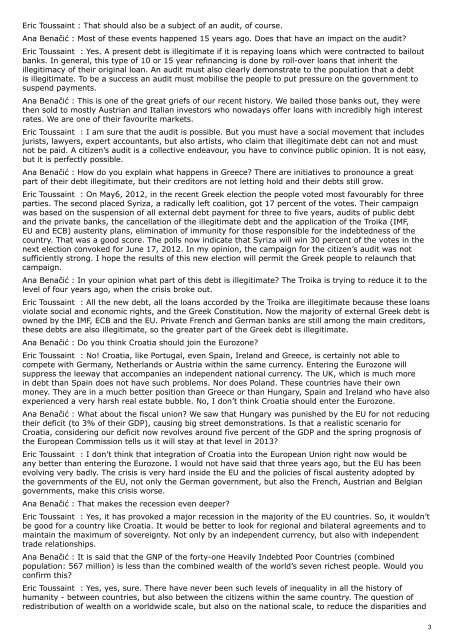Here - International Viewpoint
Here - International Viewpoint
Here - International Viewpoint
Create successful ePaper yourself
Turn your PDF publications into a flip-book with our unique Google optimized e-Paper software.
Eric Toussaint : That should also be a subject of an audit, of course.<br />
Ana Benačić : Most of these events happened 15 years ago. Does that have an impact on the audit?<br />
Eric Toussaint : Yes. A present debt is illegitimate if it is repaying loans which were contracted to bailout<br />
banks. In general, this type of 10 or 15 year refinancing is done by roll-over loans that inherit the<br />
illegitimacy of their original loan. An audit must also clearly demonstrate to the population that a debt<br />
is illegitimate. To be a success an audit must mobilise the people to put pressure on the government to<br />
suspend payments.<br />
Ana Benačić : This is one of the great griefs of our recent history. We bailed those banks out, they were<br />
then sold to mostly Austrian and Italian investors who nowadays offer loans with incredibly high interest<br />
rates. We are one of their favourite markets.<br />
Eric Toussaint : I am sure that the audit is possible. But you must have a social movement that includes<br />
jurists, lawyers, expert accountants, but also artists, who claim that illegitimate debt can not and must<br />
not be paid. A citizen’s audit is a collective endeavour, you have to convince public opinion. It is not easy,<br />
but it is perfectly possible.<br />
Ana Benačić : How do you explain what happens in Greece? There are initiatives to pronounce a great<br />
part of their debt illegitimate, but their creditors are not letting hold and their debts still grow.<br />
Eric Toussaint : On May6, 2012, in the recent Greek election the people voted most favourably for three<br />
parties. The second placed Syriza, a radically left coalition, got 17 percent of the votes. Their campaign<br />
was based on the suspension of all external debt payment for three to five years, audits of public debt<br />
and the private banks, the cancellation of the illegitimate debt and the application of the Troika (IMF,<br />
EU and ECB) austerity plans, elimination of immunity for those responsible for the indebtedness of the<br />
country. That was a good score. The polls now indicate that Syriza will win 30 percent of the votes in the<br />
next election convoked for June 17, 2012. In my opinion, the campaign for the citizen’s audit was not<br />
sufficiently strong. I hope the results of this new election will permit the Greek people to relaunch that<br />
campaign.<br />
Ana Benačić : In your opinion what part of this debt is illegitimate? The Troika is trying to reduce it to the<br />
level of four years ago, when the crisis broke out.<br />
Eric Toussaint : All the new debt, all the loans accorded by the Troika are illegitimate because these loans<br />
violate social and economic rights, and the Greek Constitution. Now the majority of external Greek debt is<br />
owned by the IMF, ECB and the EU. Private French and German banks are still among the main creditors,<br />
these debts are also illegitimate, so the greater part of the Greek debt is illegitimate.<br />
Ana Benačić : Do you think Croatia should join the Eurozone?<br />
Eric Toussaint : No! Croatia, like Portugal, even Spain, Ireland and Greece, is certainly not able to<br />
compete with Germany, Netherlands or Austria within the same currency. Entering the Eurozone will<br />
suppress the leeway that accompanies an independent national currency. The UK, which is much more<br />
in debt than Spain does not have such problems. Nor does Poland. These countries have their own<br />
money. They are in a much better position than Greece or than Hungary, Spain and Ireland who have also<br />
experienced a very harsh real estate bubble. No, I don’t think Croatia should enter the Eurozone.<br />
Ana Benačić : What about the fiscal union? We saw that Hungary was punished by the EU for not reducing<br />
their deficit (to 3% of their GDP), causing big street demonstrations. Is that a realistic scenario for<br />
Croatia, considering our deficit now revolves around five percent of the GDP and the spring prognosis of<br />
the European Commission tells us it will stay at that level in 2013?<br />
Eric Toussaint : I don’t think that integration of Croatia into the European Union right now would be<br />
any better than entering the Eurozone. I would not have said that three years ago, but the EU has been<br />
evolving very badly. The crisis is very hard inside the EU and the policies of fiscal austerity adopted by<br />
the governments of the EU, not only the German government, but also the French, Austrian and Belgian<br />
governments, make this crisis worse.<br />
Ana Benačić : That makes the recession even deeper?<br />
Eric Toussaint : Yes, it has provoked a major recession in the majority of the EU countries. So, it wouldn’t<br />
be good for a country like Croatia. It would be better to look for regional and bilateral agreements and to<br />
maintain the maximum of sovereignty. Not only by an independent currency, but also with independent<br />
trade relationships.<br />
Ana Benačić : It is said that the GNP of the forty-one Heavily Indebted Poor Countries (combined<br />
population: 567 million) is less than the combined wealth of the world’s seven richest people. Would you<br />
confirm this?<br />
Eric Toussaint : Yes, yes, sure. There have never been such levels of inequality in all the history of<br />
humanity - between countries, but also between the citizens within the same country. The question of<br />
redistribution of wealth on a worldwide scale, but also on the national scale, to reduce the disparities and<br />
3









